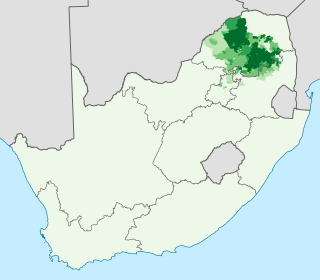
Sesotho sa Lebowa is a Sotho-Tswana language group spoken in the northeastern provinces of South Africa, most commonly in Mpumalanga, Gauteng and the Limpopo provinces. It is erroneously commonly referred to in its standardised form as Pedi or Sepedi and holds the status of an official language in South Africa.

isiNdebele, also known as Southern Ndebele is an African language belonging to the Mbo group of Bantu languages, spoken by the Ndebele people of South Africa.

A Bantustan was a territory that the National Party administration of South Africa set aside for black inhabitants of South Africa and South West Africa, as a part of its policy of apartheid.

The Province of the Transvaal, commonly referred to as the Transvaal, was a province of South Africa from 1910 until 1994, when a new constitution subdivided it following the end of apartheid. The name "Transvaal" refers to the province's geographical location to the north of the Vaal River. Its capital was Pretoria, which was also the country's executive capital.
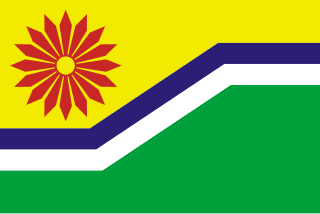
Mpumalanga is a province of South Africa. The name means "East", or literally "The Place Where the Sun Rises" in the Nguni languages. Mpumalanga lies in eastern South Africa, bordering Eswatini and Mozambique. It shares borders with the South African provinces of Limpopo to the north, Gauteng to the west, the Free State to the southwest, and KwaZulu-Natal to the south. The capital is Mbombela.
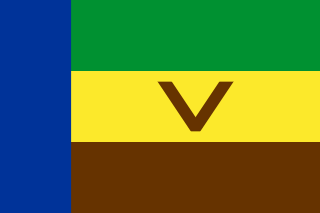
Venda or Tswetla, officially the Republic of Venda, was a Bantustan in northern South Africa. It was fairly close to the South African border with Zimbabwe to the north, while, to the south and east, it shared a long border with another black homeland, Gazankulu. It is now part of the Limpopo province. Venda was founded by the South African government as a homeland for the Venda people, speakers of the Venda language. The United Nations and international community refused to recognise Venda as an independent state.

Dr Cedric Namedi Phatudi was the Chief Minister of Lebowa, one of the South African bantustans.

KwaNdebele was a bantustan in South Africa, intended by the apartheid government as a semi-independent homeland for the Ndebele people. The homeland was created when the South African government purchased nineteen white-owned farms and installed a government.
The Northern Ndebele people are a Nguni ethnic group native to Southern Africa. Significant populations of native speakers of the Northern Ndebele language (siNdebele) are found in Zimbabwe and in South Africa.
Lebowakgomo is the seat of the Lepelle-Nkumpi Local Municipality and was the capital of the former Bantustan of Lebowa. Lebowakgomo lies 45 km (28 mi) southeast of the Limpopo capital of Polokwane. The majority of Lebowakgomo's inhabitants speak SePedi.
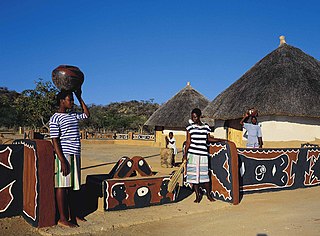
The Pedi or Bapedi, also known as the Sotho, Basotho, Northern Sotho, Basotho ba Lebowa, Transvaal Sotho, Marota, or Dikgoshi.

AmaNdebele are an ethnic group native to South Africa who speak isiNdebele. They mainly inhabit the provinces of Mpumalanga, Gauteng and Limpopo, all of which are in the northeast of the country. In academia this ethnic group is referred to as the Southern Ndebele to differentiate it from their relatives the Northern Ndebele people of Limpopo and Northwest.
Seshego is a township in the Polokwane Local Municipality of the Capricorn District Municipality of the Limpopo province of the Republic of South Africa. The township lies directly northwest of the city of Polokwane.
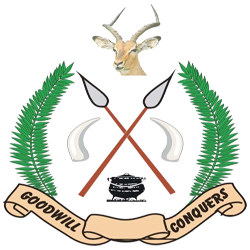
Bushbuckridge Municipality is a local municipality within the Ehlanzeni District Municipality, in the Mpumalanga province of South Africa. Commercial farming, which consists of pine and bluegum plantations, tobacco, cotton, sub-tropical fruits and vegetables is practised in the municipality's countryside. The municipality includes the southern part of the Kruger National Park. Bushbuckridge is the largest local municipality in Mpumalanga in terms of land size.
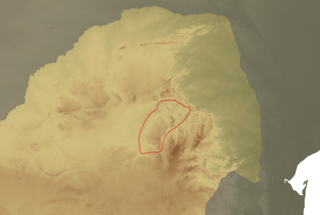
Sekhukhuneland or Sekukuniland is a natural region in north-east South Africa, located in the historical Transvaal zone, former Transvaal Province, also known as Bopedi. The region is named after the 19th-century King, Sekhukhune I.

Chupu Stanley Mathabatha is a South African politician who is currently the Premier of Limpopo. He was elected to the position in July 2013 after the resignation of Cassel Mathale. He was previously a public servant in Limpopo province and from 2012 to 2013 completed a brief stint as a diplomat, serving as South African Ambassador to Ukraine under President Jacob Zuma.
Mogoboya Nelson Ramodike was a South African politician who served as Chief Minister of Lebowa, an apartheid-era bantustan, from 21 October 1987 to 26 April 1994. He subsequently represented the United Democratic Movement in the National Assembly from 1999 to 2003.
Before 1994, South Africa had only four provinces: Cape Province, Natal Province, Orange Free State and Transvaal. Each province had its own identifying lettering: Cape – C, Natal – N, Orange Free State – O and Transvaal – T.
Molapatene Collins Ramusi was a South African politician and lawyer who represented the African National Congress (ANC) in the National Assembly from 1994 until his death in 1996. He was formerly a prominent politician in Lebowa, where he was Minister of the Interior.
Matsaro Violet Semenya is a South African judge who has been Deputy Judge President of the Limpopo High Court since July 2021. She was appointed that court as a puisne judge in January 2017. Before joining the judiciary, she was a magistrate in Limpopo between 1991 and 2017.















